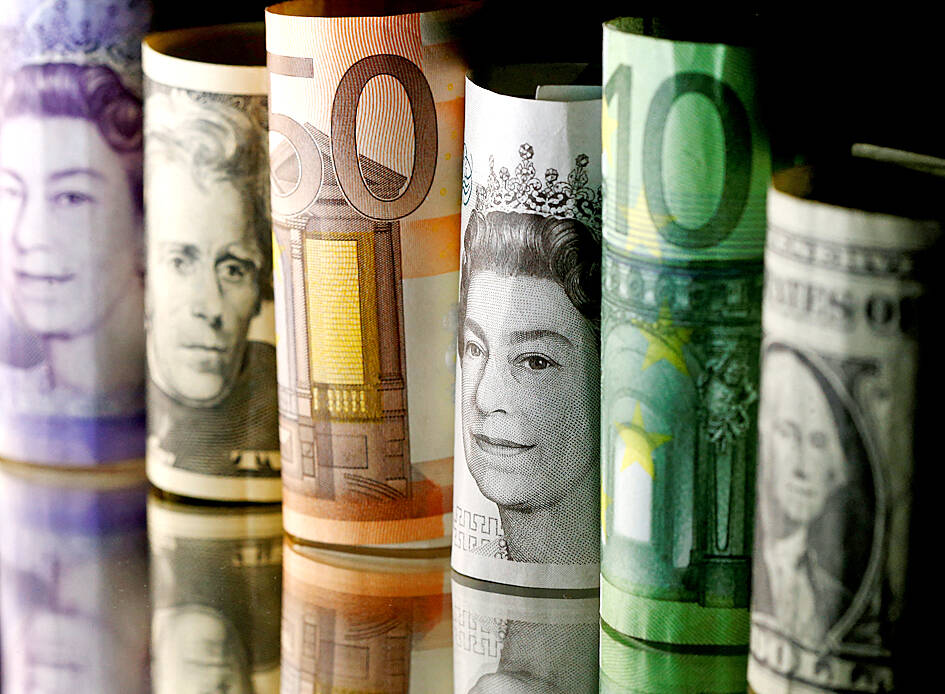The nation’s foreign exchange reserves last month rose US$3.08 billion to another record high of US$570.6 billion, helped by capital inflows betting on rallies of technology shares linked to potential interest rate cuts by the US Federal Reserve, the central bank said on Friday.
It also came as the central bank continued market intervention to keep the New Taiwan dollar from rising further against the US dollar, as well as an increase in investment returns from portfolio management by the bank during the month, it said.
The central bank reported a net flow inflow of US$6 billion last month, lower than Financial Supervisory Commission’s US$8.68 billion tally, which failed to include outbound remittance of capital gains, Department of Foreign Exchange Director-General Eugene Tsai (蔡炯民) told a news conference in Taipei.

Photo: Reuters
Foreign exchange reserves last year increased 22.82 percent, or US$15.66 billion, despite net capital outflow of US$4.5 billion, Tsai said.
Continued global monetary tightening last year drove international fund managers and investors to trim holdings in emerging stock markets and raise positions in US dollar-based investment portfolios that promise better returns, he said.
The trend took a steep turn after the Fed early last month sent dovish-leaning messages that the monetary tightening cycle is approaching an end and it is contemplating interest rate cuts in the coming months.
Against this backdrop, the NT dollar appreciated 1.64 percent against the greenback last month after a 3.71 percent plunge the previous month, the central bank said.
The NT dollar was not the only non-greenback currency to move higher last month, with many other currencies also appreciating against the US dollar as the market rapidly changed its expectations about the Fed’s move to a rate cut cycle, which created volatility, he said.
The yen picked up 3.96 percent, the Swiss franc gained 3.45 percent and the Australian dollar rose 3.01 percent versus the greenback.
The yuan, which had previously weakened against the US dollar, also moved higher by 0.41 percent, he said.
Overall, Taiwan’s foreign exchange reserves rank as the world’s fourth-largest behind China, Japan and Switzerland, Tsai said.
The central bank’s data also showed the value of foreign investors’ asset holdings of Taiwan-listed stocks and bonds, and NT dollar-denominated deposits rose to US$640.8 billion at the end of last month, from US$605.1 billion the previous month.
The holdings represented 112 percent of Taiwan’s total foreign exchange reserves as of the end of last month, up from 107 percent at the end of November, the data indicated.

POWERING UP: PSUs for AI servers made up about 50% of Delta’s total server PSU revenue during the first three quarters of last year, the company said Power supply and electronic components maker Delta Electronics Inc (台達電) reported record-high revenue of NT$161.61 billion (US$5.11 billion) for last quarter and said it remains positive about this quarter. Last quarter’s figure was up 7.6 percent from the previous quarter and 41.51 percent higher than a year earlier, and largely in line with Yuanta Securities Investment Consulting Co’s (元大投顧) forecast of NT$160 billion. Delta’s annual revenue last year rose 31.76 percent year-on-year to NT$554.89 billion, also a record high for the company. Its strong performance reflected continued demand for high-performance power solutions and advanced liquid-cooling products used in artificial intelligence (AI) data centers,

SIZE MATTERS: TSMC started phasing out 8-inch wafer production last year, while Samsung is more aggressively retiring 8-inch capacity, TrendForce said Chipmakers are expected to raise prices of 8-inch wafers by up to 20 percent this year on concern over supply constraints as major contract chipmakers Taiwan Semiconductor Manufacturing Co (TSMC, 台積電) and Samsung Electronics Co gradually retire less advanced wafer capacity, TrendForce Corp (集邦科技) said yesterday. It is the first significant across-the-board price hike since a global semiconductor correction in 2023, the Taipei-based market researcher said in a report. Global 8-inch wafer capacity slid 0.3 percent year-on-year last year, although 8-inch wafer prices still hovered at relatively stable levels throughout the year, TrendForce said. The downward trend is expected to continue this year,

Vincent Wei led fellow Singaporean farmers around an empty Malaysian plot, laying out plans for a greenhouse and rows of leafy vegetables. What he pitched was not just space for crops, but a lifeline for growers struggling to make ends meet in a city-state with high prices and little vacant land. The future agriculture hub is part of a joint special economic zone launched last year by the two neighbors, expected to cost US$123 million and produce 10,000 tonnes of fresh produce annually. It is attracting Singaporean farmers with promises of cheaper land, labor and energy just over the border.

US actor Matthew McConaughey has filed recordings of his image and voice with US patent authorities to protect them from unauthorized usage by artificial intelligence (AI) platforms, a representative said earlier this week. Several video clips and audio recordings were registered by the commercial arm of the Just Keep Livin’ Foundation, a non-profit created by the Oscar-winning actor and his wife, Camila, according to the US Patent and Trademark Office database. Many artists are increasingly concerned about the uncontrolled use of their image via generative AI since the rollout of ChatGPT and other AI-powered tools. Several US states have adopted